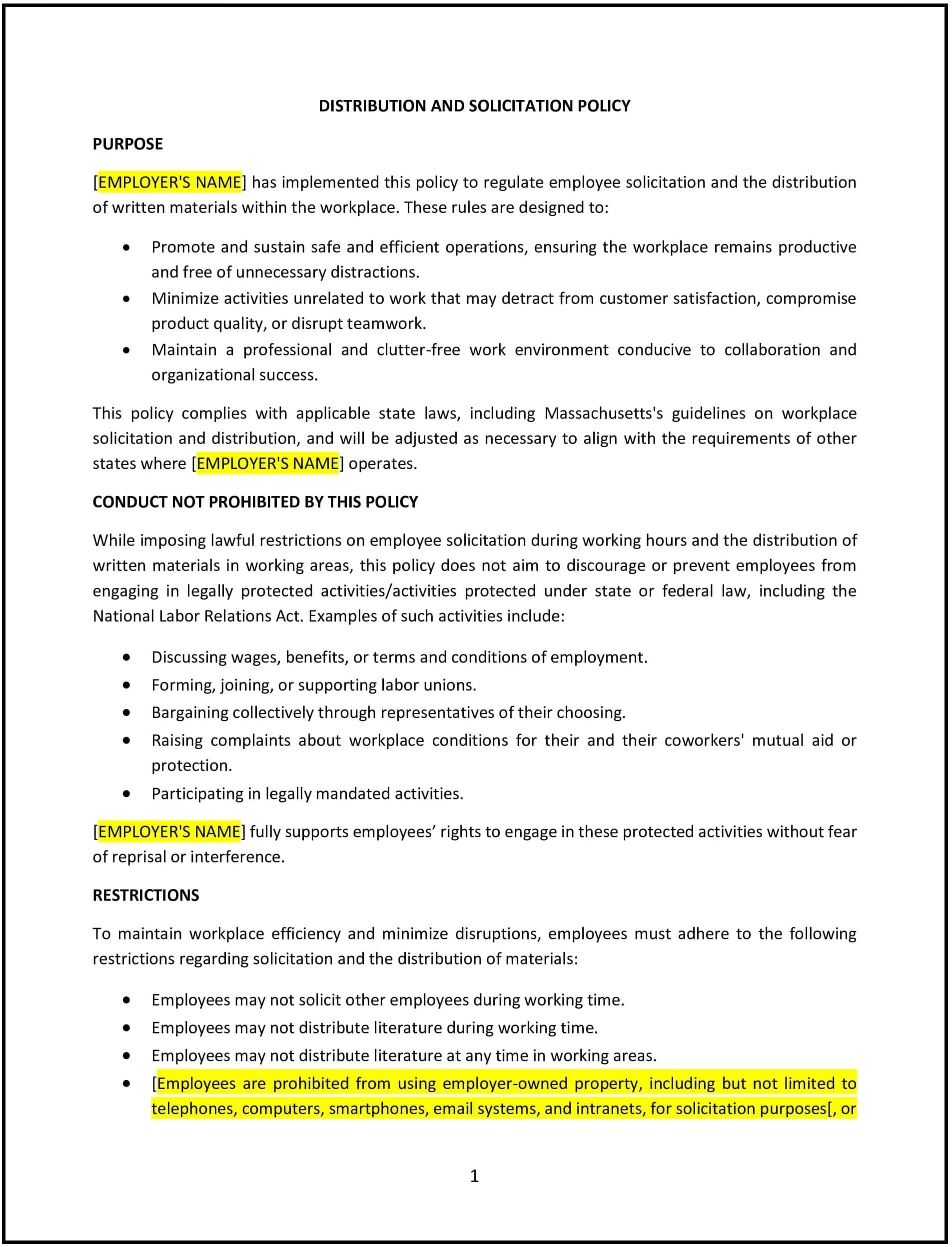Distribution and solicitation policy (Massachusetts): Free template
Got contracts to review? While you're here for policies, let Cobrief make contract review effortless—start your free review now.

Customize this template for free
This distribution and solicitation policy is designed to help Massachusetts businesses regulate the distribution of materials and solicitation activities within the workplace. The policy outlines the guidelines for employees, vendors, and other individuals who wish to distribute materials or engage in solicitation for charitable, commercial, or other purposes. The policy ensures that such activities are conducted in a manner that does not interfere with business operations or create a disruptive work environment.
By adopting this policy, businesses can maintain a productive and respectful workplace while complying with Massachusetts state laws and federal regulations regarding solicitation and distribution activities.
How to use this distribution and solicitation policy (Massachusetts)
- Define acceptable distribution and solicitation activities: Specify what types of distribution and solicitation activities are permitted within the workplace. These may include charitable solicitations, the distribution of promotional materials, or recruitment efforts. The policy should clarify which types of activities are allowed and under what conditions.
- Establish approval processes: Set a process for obtaining approval to engage in solicitation or distribution within the workplace. The policy should outline how individuals must seek approval from management or HR before engaging in solicitation or distributing materials.
- Designate appropriate areas and times: Define where and when solicitation and distribution activities are allowed within the workplace. For example, employees may be permitted to solicit during breaks in common areas or distribute materials in designated areas, but not during work hours or in private offices.
- Address restrictions: Specify any restrictions on the types of materials that can be distributed or the types of solicitations that can occur. This may include prohibiting political, religious, or commercial solicitations that could create conflicts of interest or disrupt the workplace.
- Prohibit harassment: Emphasize that all solicitation and distribution activities must be conducted respectfully and without harassment. The policy should include language that prohibits any behavior that could be considered aggressive or intrusive, such as pressuring coworkers or customers to participate in solicitation efforts.
- Ensure compliance with Massachusetts and federal laws: Ensure that the policy complies with Massachusetts state laws and federal regulations, including laws related to free speech, workplace harassment, and the National Labor Relations Act (NLRA), which protects employees' rights to engage in certain types of solicitation and distribution activities.
- Clarify consequences for policy violations: Clearly define the consequences for violating the policy, which may include disciplinary action or the removal of materials from the workplace. The policy should outline the process for handling violations in a fair and consistent manner.
Benefits of using this distribution and solicitation policy (Massachusetts)
This policy offers several benefits for Massachusetts businesses:
- Maintains workplace order: By setting clear rules for solicitation and distribution, the policy helps prevent disruptions, ensuring that business operations run smoothly and employees can focus on their tasks without distractions.
- Promotes a respectful work environment: The policy fosters a respectful and professional work environment by ensuring that solicitation activities are conducted in a non-disruptive manner, promoting courtesy and consideration among employees.
- Protects company interests: The policy helps prevent unwanted solicitation or distribution of materials that could damage the company’s reputation, create conflicts of interest, or promote competing interests.
- Complies with legal requirements: The policy helps ensure that solicitation and distribution activities comply with Massachusetts state laws, federal regulations, and any industry-specific requirements, reducing the risk of legal disputes or penalties.
- Enhances employee satisfaction: By providing guidelines for solicitation and distribution activities, businesses can create a workplace culture where employees feel comfortable and respected, promoting overall job satisfaction and engagement.
- Reduces potential for conflicts: The policy helps prevent conflicts between employees or external parties by setting clear boundaries around acceptable solicitation and distribution practices.
Tips for using this distribution and solicitation policy (Massachusetts)
- Communicate the policy clearly: Ensure all employees understand the policy regarding solicitation and distribution. This can be done through employee handbooks, training sessions, or notices posted in common areas.
- Provide training on acceptable conduct: Provide employees with training on what constitutes acceptable solicitation and distribution behavior, emphasizing respect for coworkers and the company’s guidelines.
- Regularly monitor compliance: Monitor solicitation and distribution activities to ensure they are conducted in accordance with the policy. This may involve periodically checking common areas or reviewing requests for approval.
- Be responsive to requests: Ensure that employees or external parties who wish to engage in solicitation or distribution activities are given a prompt response to their request, and that any approved activities are properly coordinated with management.
- Address complaints promptly: Address any complaints or violations of the policy in a timely manner. Ensure that employees know how to report violations and that their concerns will be handled confidentially and professionally.
- Review and update regularly: Periodically review the policy to ensure it is compliant with Massachusetts state laws, federal regulations, and the company’s evolving needs. Update the policy as necessary to address changes in business practices or employee feedback.